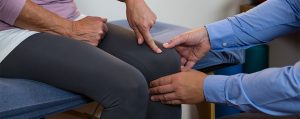Elbow Injuries In Tumbling Athletes
Tumbling athletes, which include gymnasts and cheerleaders, have unique demands placed on their upper body. When tumbling, the athlete places not only their entire body weight through their hands but can have up to 16 times their body weight in force going across the wrist and arm. For that reason, the elbow can be injured more often in these athletes. In this blog, we will take a closer look at several types of injuries that can occur in tumbling athletes, along with symptoms and treatment options.
A Quick Workout for New Parents Who Need a Boost of Energy
Becoming a parent is an exhilarating and rewarding journey, but it can also be exhausting at times. Between sleepless nights, diaper changes, and constant attention to your little one, finding time for yourself can be challenging. However, taking care of your own well-being is crucial to being the best parent you can be. One effective way to boost your energy levels and improve your overall mood is through a quick workout routine. In this blog, we will explore a simple, yet effective workout specifically designed for new parents who need a much-needed energy boost.
Impact Exercise for the Aging Adult
MYTH: You must stop doing high impact exercise as you age and perform low impact activities instead.
FACT: We know that as we age, it is common to lose strength and power. However, that does not mean you have to avoid higher impact activities.
Many people are active when they are younger through sports, running, and other activities. As we get older, we tend to decrease high impact activities. Sometimes this is due to a previous injury, reoccurring pain, or a fear of getting hurt.
5 Tips To Help You Get In Touch with Your Most Active Self
In today’s fast-paced and hectic world, staying active and maintaining a healthy lifestyle can sometimes feel like a challenge. However, by tapping into your most active self, you can unlock your full potential and lead a more energetic and fulfilling life. Whether you’re looking to kick-start a new fitness routine or revitalize your existing one, these five tips will help you reconnect with your most active self and embrace a lifestyle of vitality.
Seven Health Benefits Of Taking Your Workouts To The Great Outdoors
Regular exercise is key to a long and healthy life. While there are countless exercise styles, methods, and equipment, the most important aspect is picking an exercise that we are most likely to stick with. Have you ever been curious to try exercising outside? When people run past you on the sidewalk, or complete a set of pull-ups while your children are on the playground, do you wish you could do the same thing? These outdoor exercisers may be on to something, and we could all benefit from more fresh air during our next workout.
Should I Exercise If My Joints Make Noise?
Do your joints make noises when you move? Many people hear noises such as pops, creaks, or grinding in their joints, often in the knees, with activities such as going up stairs or squatting down. But it’s important to know that these noises can be normal, especially if they are not associated with any kind of pain! When joints make noise, it is commonly known as crepitus. Let’s take a closer look at what crepitus is and what you need to know in order to continue safe exercise.
How Exercise Can Help You Connect With Your Child
Connection with your child can take many forms over the arc of parenting. From the days of dependency in early life, to watching them become their own person – parents are always searching out ways to connect with their children.
5 Exercises To Decrease ACL Injury Risk
ACL injuries are one of the most impactful injuries in sports, often taking 9-12 months before an athlete can return to competition. Athletes who participate in change of direction sports such as soccer, basketball, and football tend to have the greatest risk of ACL injury.
